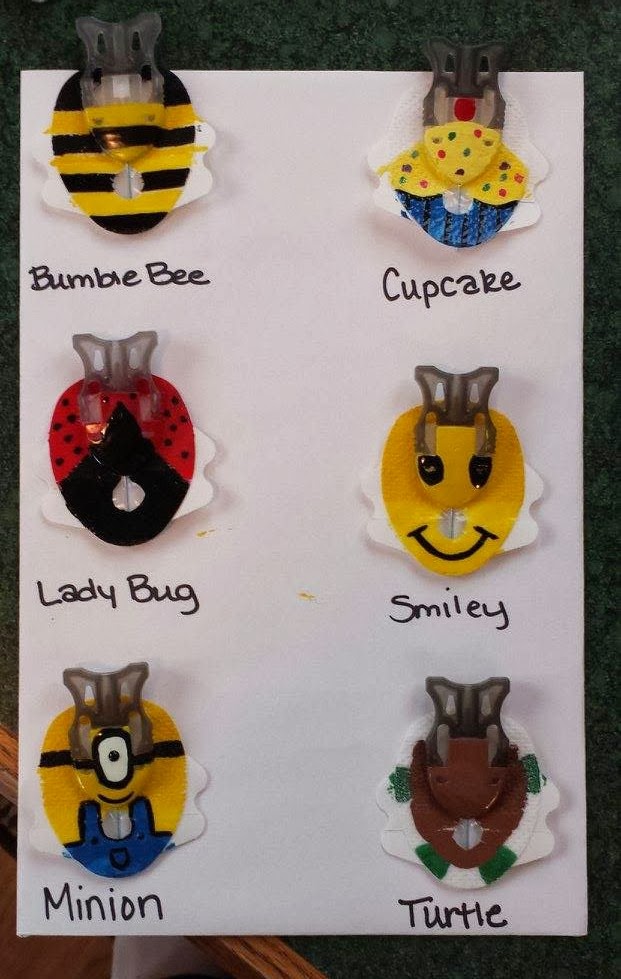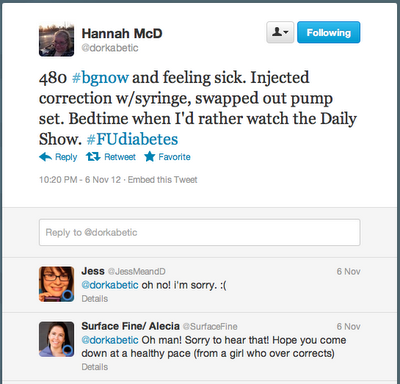It began with a conversation on Facebook about the following quote on
My Diabetes Secret:
"I publicly blame my lack of recent involvement in the DOC on my crazy schedule when in reality, I’m sick of feeling judged, alienated, and deserted by the group that’s supposed to support and encourage me and everyone else touched by diabetes."
I've noticed that this general sentiment cycles through our community every so often; a visible, vocal frustration concerning the dichotomy of our open, supportive reputation and the harsh reality that not everyone who approaches the community is welcomed with open arms. When we're really down, it can take a lot of the dwindling energy and motivation we have to actually reach out and say "Hey, I'm having a really hard time. Help.", and when those pleas go unanswered, we feel abandoned.
I also worry (a lot) that some of the "look at what I can accomplish with diabetes!" stuff does more harm than good; perhaps for some, it does more to discourage than inspire. For some who have reached their rock bottom, the bright lights are less illuminating and more
blinding. The further you are from "okay", the more resentful and bitter you become of those who have achieved some semblance of it and your ears and eyes and heart shut out exactly everything that others want them to take in. When you're deep down in it, there is no suggestion or advice or solution or logic that can work. When diabetes, or life, or anything has drug you down and nailed you to the floor and made you so convinced that even your tiniest little effort will be futile because failure is your mode now and there's no hope left - what can anyone do for that person
then?
It becomes difficult, again then, when we all come to the table with differing expectations and needs. Some of us find what we need in reading the words of others; for some a tumble down a YouTube vortex sets them right for awhile. Some of us need immediate responses; some of us require just one person to speak up and say they get it. Some of us need drama. Some of us need attention.
None of it's wrong, assuming we're being honest about our situation. The trouble lies in what we reasonably expect the role of others to be.
I'm not saying our community doesn't have assholes in it or people who embellish the truth (or just selectively tell it) or people who perhaps take themselves a bit too seriously. We have exactly those people, just like the rest of the world, because our diabetes community is a microcosm. Diabetes doesn't discriminate.
What I've been thinking about, moreso today than normal, is what our role might be for each other. We are no official community; there are no credentials required or tests passed or rules for membership - we are this living, evolving, semi-solid of an organism whose adhesive is some combination of circumstance and empathy, a call to both arms and duty. What keeps us together, and what I hope we remember in times of divisiveness, is
sameness. We're all dealing with this same horrible thing. It may not always look or act the same, and we may not all react to it in the same way, but all of it is horrible.
So what can we do?
I don't know, but I can tell you what we can't do. We can't be hammers looking for nails. I think that's where we trip up - we don't have to "fix" everything that's wrong. Sometimes, things just have to be shitty. But if it's shitty out in the open, if we admit and share and yes, sometimes even
bask in those feelings out in the open, that takes away the part of the burden that says "I'm a horrible person for thinking this. What is wrong with me? No one else is as messed up as I am."
What you can do is say, "Yes it is, and I'm right in it with you, and we're going to be not okay together."
And if those you open yourself to don't respond in the ways you'd hoped, remember that everyone is dealing with
something, even if you can't see it, and the way they respond to you may not be a reflection of
you, per se, but a comment on how overwhelmed
they already are. Most of us aren't doctors and haven't received any kind of training in how to "help" in these kinds of situations, but we are all human and can offer empathy.
But... empathy requires energy, and if you've already spent yours just keeping yourself afloat, there's not going to be much to spare for others. We can't be everything for everyone and expect to have anything left for ourselves at the end of the day. (
Spoons, and all that.)


































